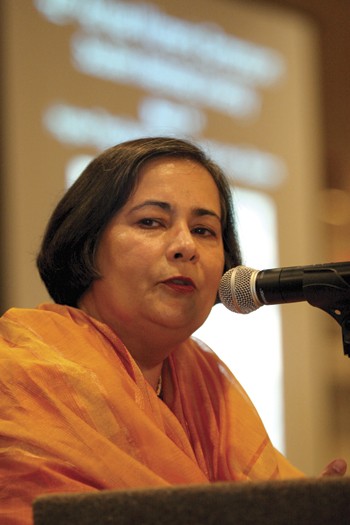
Asma Barlas, professor of politics and the Director of the Center for the Study of Culture, Race, and Ethnicity at Ithaca College, speaks at the Women’s Symposium on Thursday. (Nick McCarthy)
Global issues affecting women and how to get involved were just a few of the topics discussed at the 42nd Annual Women’s Symposium on Thursday.
The theme for this year’s symposium was “A Collective Purpose: Crossing the Cultural Boundaries.” One cultural boundary discussed was the issue of Islam and the suppression that Muslim women face. Asma Barlas, a professor of politics and the director of the Center for the Study of Culture, Race and Ethnicity at Ithaca College, said that it is not Islam or the Koran that suppresses women, but those who misinterpret the text.
“The Koran designates men and women as each other’s guide,” Barlas said. “But how can one claim this role if men insist on dominating women?”
While Barlas admitted that men and women are not viewed the same in the Koran, she said that it is not the text that is responsible for oppressing women, but people who choose to read it negatively.
“It is true that the Koran treats men and women differently, but different in itself doesn’t imply inequality,” Barlas said. “I find it pointless to blame the Koran for women’s oppression because we can read it in different ways. And the Koran asks us to read it in the best way.”
Linda Evans, an adjunct lecturer of English as a second language, said that she believes this is true for all religions, not just Islam, and that people also need to pay attention to the different definitions a word can have.
“People can always find scripture and passages to use to support their point of view,” Evans said. “There can be many translations of a word, and often the most negative translation is selected instead of the best possible interpretation.”
Barlas concluded her speech by encouraging her audience to honor the differences of others because without embracing those differences, she said we are only hurting ourselves.
“Can we chip away at the armor of ignorance [in] which many of us have imprisoned ourselves?,” Barlas said. “We’ve learned to make peace with ourselves and who we are because we cannot stand the pain of looking at ourselves, even if that sets us free.”
One of the other topics discusses at the Women’s Symposium was human rights. Dr. Rick Halperin, director of the SMU Human Rights Education Program, said that what made him most upset concerning women’s rights was the lack of male audience members.
“The only sad thing to me is that this audience is only one gender, because the gender that really needs to be here is not,” Halperin said. “The biggest problem women face today is men. This is a man’s world, and men are the ones who make the laws in which we have to get by.”
However, whether you are a man or woman, Halperin said we all have the power to affect human rights and the world around us.
“The failure here is to do nothing,” Halperin said. “There is so much to do it’s overwhelming, but to do something is better than to do nothing. We all have biological families, but we also have human rights families. You just haven’t met yet.”









